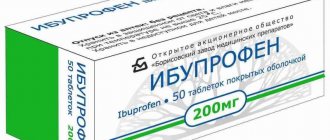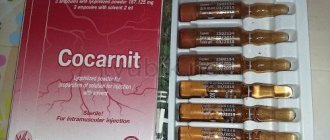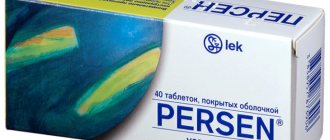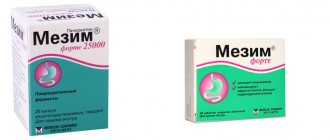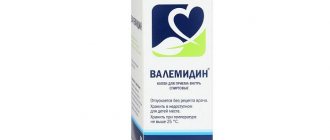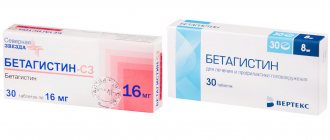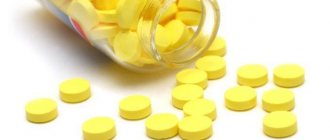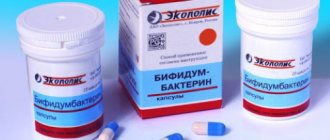Indications for use
Askofen - p simultaneously belongs to both the group of antipyretics and analgesics. The presence of paracetamol in the composition allows you to effectively reduce elevated body temperature .
In addition, there is a powerful anti-inflammatory effect. Acetylsalicylic acid, which is one of the active ingredients, has the property of thinning the blood. The effect of aspirin is aimed at preventing blood clots. Caffeine dilates blood vessels and activates vasomotor and respiratory processes.
In addition to the above, it has a stimulating effect, preventing drowsiness and a broken state. Askofen - p is indicated for:
- Dental pain syndrome;
- Prolonged migraines;
- Lumbago syndrome;
- Myalgia;
- Algodismenorrhea;
- Increased body temperature;
- The presence of viral diseases;
Askofen P - what are these tablets for?
For headaches, which mainly affect women, Askofen P in tablet form is often used. This drug is a complex remedy with a combined composition, including antipyretic and anti-inflammatory components, so it can be used not only for migraines. It is important to know all the features and the exact list of pathologies for which Askofen P is prescribed - what these tablets are for, how they affect the cardiovascular system, what are their main side effects and signs of overdose.
Full composition of the drug Askofen P
Active ingredients of the medication in question:
- paracetamol;
- acetylsalicylic acid (aspirin);
- caffeine.
Excipients of tablets:
- low molecular weight medical povidone;
- calcium stearate;
- potato starch;
- stearic acid;
- Vaseline oil;
- talc;
- silicone emulsion.
What does Askofen P help with?
Thanks to the described combined composition, the presented drug can be classified as an analgesic and antipyretic. Paracetamol has a direct effect on the thermal regulation center in the hypothalamus. It is also capable of weakly inhibiting the production of prostaglandins in peripheral tissues. This causes a pronounced antipyretic and obvious analgesic effect in combination with some anti-inflammatory effect.
Acetylsalicylic acid is known for its blood thinning properties; aspirin moderately inhibits the intensity of platelet accumulation and, accordingly, the formation of blood clots in blood vessels. Moreover, this ingredient improves local microcirculation of biological fluid. Thanks to this, acetylsalicylic acid produces a noticeable antipyretic and anti-inflammatory effect and is capable of relieving pain.
Caffeine has the following effects:
- increased reflex excitability of the spinal cord;
- dilation of blood vessels in the skeletal muscle area;
- stimulation of the vasomotor and respiratory centers;
- improvement of physical and mental activity, performance;
- an increase in the diameter of the blood vessels of the kidneys, heart and brain;
- reducing feelings of fatigue, drowsiness;
- decreased platelet aggregation in the blood.
Askofen P tablets contain only 40 mg of caffeine. This dosage is optimal, as it allows you to achieve all of the above effects without significant stimulation of the central nervous system, and also ensures normalization of the tone of cerebral blood vessels and acceleration of general blood flow in the body.
The indicated pharmacological properties of the active components of the drug determine the indications for Askofen P:
1. Feverish syndrome:
- acute respiratory diseases;
- flu;
- heat of various origins.
2. Pain syndrome:
- myalgia;
- headache;
- neuralgia;
- lumbago;
- migraine;
- algodismenorrhea;
- toothache;
- arthralgia;
- thoracic radicular syndrome.
It is worth noting that the drug in question only helps with mild to moderate pain.
Does Askofen P increase or decrease blood pressure?
Given the composition of the tablets, which contains caffeine, Askofen P should not be taken by patients with arterial hypertension. The fact is that this drug is still capable of slightly increasing blood pressure.
Why is an overdose of Askofen P dangerous?
Exceeding the doses specified in the instructions may result in intoxication of the body with acetylsalicylic acid. This manifests itself as follows:
- collapse;
- nausea and vomiting;
- convulsions;
- gastralgia;
- bronchospasms;
- anuria;
- opening of internal bleeding;
- suffocation;
- respiratory paralysis;
- respiratory acidosis;
- respiratory alkalosis;
- lethargy, confusion.
Contraindications
Despite its effectiveness, taking Askofen is not possible in all cases. The fact is that this drug has a number of contraindications.
It is very important to consider them before you start taking them. In addition, drinking alcoholic beverages is prohibited while taking the drug. This may cause bleeding in the gastrointestinal tract . Askofen-p should not be taken if you have the following conditions:
- Asthma;
- Deviations in the functioning of the kidneys and liver;
- Insomnia;
- Diseases of the cardiovascular system;
- Dissecting aortic aneurysm;
- Internal bleeding of any nature;
- Hemorrhagic diathesis;
- Individual reactions to the components of the drug;
- Lack of vitamin K;
Features of application
The drug should not be taken together with NSAIDs that contain salicylic acid, as this will lead to decreased effectiveness and problems with the gastrointestinal tract.
Before taking, you should study the instructions, which describe all contraindications. Only the doctor can increase the dose and duration of the course after diagnosing and studying the patient’s tests.
It is not advisable to treat headaches with this remedy when there is a disease of the digestive system.
It is not recommended to drink Askofen and at the same time indulge in black tea or strong coffee, this can lead to insomnia.
It is strictly not recommended to take Askofen during pregnancy, since the substances that make up it pass through the placenta to the fetus.
First aid for overdose
If the patient shows signs of overdose, you need to give him warm water (about 900 ml) to drink and immediately induce vomiting. After this, take activated carbon at the rate of 1 tablet per 10 kg of person’s weight. It is necessary to cleanse the body immediately, because over the next 9 hours the process of destruction of liver cells begins, as a result of which the stomach begins to ache sharply, the skin becomes pale, and the person begins to feel sick.
It is important to understand that when the liver is damaged, liver failure occurs, and this can lead to fatal consequences!
Before starting treatment with these or other medications, you should consult a doctor. Only a specialist will be able to determine the exact cause of the pain and select the most effective drug.
Dosage and method of administration
For long-term treatment , the drug is prescribed to take 1-2 tablets up to three times a day, depending on the complexity of the disease. For one-time relief of pain, take 1-2 tablets of Ascofern - p. The daily dose should not exceed more than 6 tablets. Reception is carried out after eating.
It is necessary to ensure that the interval between doses is at least 4 hours. Administration is carried out orally using large amounts of water. You can also take the drug with milk or sparkling water.
Askofen - p is used as an anesthetic for no more than 5 days; to lower the temperature, it should not be used for more than 3 days. In other cases, the dosage is prescribed individually by the attending physician.
How to take the medicine correctly?
The tablets should be taken orally during or immediately after meals. You must take a tablet every four hours. In case of intense pain, the single dosage can be increased to two capsules. You can take up to eight tablets per day. The duration of treatment should not exceed ten days, according to the instructions for use for Askofen. At what pressure is the drug used? The medication is used for hypotension.
The drug cannot be used for more than five days as an analgesic drug and more than three days as an antipyretic drug without prior prescription and supervision of a medical specialist. The doctor may prescribe a different dose, frequency and duration of use of the drug, taking into account the signs of the disease and the individual characteristics of the human body.
Side effects
When the dosage is increased or the drug is taken for a longer period of time, side effects may occur . They manifest themselves in impaired renal and liver function and exacerbation of peptic ulcer disease. In the presence of bronchial diseases, taking Askofen - p can provoke an increase in asthma.
With a one-time use of the medicine, allergic reactions of an individual nature may occur. As a rule, they manifest themselves in the form of characteristic rashes, itching, redness of the skin, etc. The occurrence of this phenomenon is provoked by one of the active components of the drug.
If any of the listed symptoms occur, you should stop taking it and consult a specialist. During treatment, liver function and blood counts should be monitored.
Overdose
Askofen - p refers to drugs, the use of which requires compliance with the dosage. Otherwise, unpleasant reactions of the body may occur. An overdose of the drug causes nausea, dizziness, and ringing in the ears. The patient notices characteristic sensations in the stomach, sweating increases and chills appear.
At the same time, the skin begins to turn pale, and breathing difficulties appear. In some cases, bleeding may occur or convulsions may occur. If you establish symptoms of poisoning, you must urgently call an ambulance.
To eliminate symptoms, the patient is hospitalized or treated inpatiently, depending on the severity of the poisoning. In this condition, standard gastric lavage and activated charcoal are indicated.
Interaction with other drugs
Taking Askofen - p has a number of nuances in use. It can enhance the effects of certain medications when taken simultaneously. These include products containing heparin, indirect anticoagulants and hormonal drugs.
Medicines that are used to remove uric acid from the body reduce their effect under the influence of Askofen - p. Simultaneous use also increases the adverse reactions of analgesics and anti-inflammatory drugs . Therefore, you should be extremely careful when carrying out complex treatment.
The caffeine contained in Askofen is capable of accelerating the absorption of ergotamine. And paracetamol promotes the rapid elimination of chloramphenicol from the body. Complex therapy of the drug with Salicylamide can provoke liver diseases.
Use with other medications
It cannot be taken together with alcohol - this combination can cause severe, sometimes even fatal, consequences for the body. The drug should not be taken with rifampicin, medications containing aspirin, anticonvulsants or barbiturates. Also, while taking the drug, you should avoid coffee, drinks and medications containing caffeine.
We hope that we were able to clarify the situations in which it is possible to take Ascophen, and in which it is better to refuse. If you are unsure about the need to take the drug, consult your doctor. Be healthy!
Recommendations
The drug should be stored in a dark place, at a temperature of no more than 25 °C. Two years after manufacture, the drug is no longer suitable for use. In this case, there will be no benefit from the medicine, and harm is quite likely.
Despite its positive qualities, Askofen is not the only one of its kind. As analogues of the drug, you can use Citramon, Upsarin Upsa, Aspirin or Citropak. These drugs are similar to Askofen in their effects.
The cost of the drug may vary depending on the place of purchase and the manufacturing company. On average, the cost ranges from 20 to 50 rubles per package, which is a blister of 10 tablets. Since the drug can affect the process of blood clotting, you should warn your doctor about taking it in case of an upcoming surgical intervention. This is extremely important.
The use of the drug in this case will be canceled. If you have even a slight sensitivity to the components of the drug, you should be vigilant while taking it. For example, in patients suffering from a certain predisposition, taking Askofen - p can provoke gout.
Analogues of "Askofen"
The following drugs are substitute drugs:
- Excedrin.
- "Citramon".
- "Coficil-plus."
- "Citrapar".
- "Migrenol Extra".
If you need to replace Askofen with another drug, you must first consult with a medical specialist.
During pregnancy
Experts do not advise pregnant women to take Askofen-p. However, there are situations when this is simply necessary. In the first and third trimesters, the use of the drug is strictly contraindicated. In the second trimester, a one-time dose is possible. But there must be good reasons for this, since Askofen-p can have a negative effect on the development of the fetus.
In the early stages of pregnancy, it can provoke its termination. In addition, there is a possibility of developing a cleft palate if you take the medicine in the first trimester of pregnancy. At the end of pregnancy, the use of the drug can affect blood circulation, the process of labor and cause pulmonary vascular hyperplasia in the fetus.
Sometimes women mistake a pregnancy symptom such as a rise in temperature for the onset of a cold, and take an Askofen-p tablet. As a rule, in such situations the risk of possible complications is extremely low. But you can protect yourself by drinking an activated carbon tablet.
Increases or decreases blood pressure
Very often, Askofen-p is also taken for low blood pressure . There is no information about this in the instructions. But this fact does exist. The drug contains caffeine, which can increase blood pressure and improve the condition of hypotensive patients. When taking it, performance increases, weakness and drowsiness disappear, and dizziness goes away.
Askofen-p is relevant when climate conditions change. It is during this period that most people experience strong surges in blood pressure. However, it should be remembered that the drug is not a panacea for regulating blood pressure, since there is not a word about this in the instructions.
In exceptional cases, hypotensive patients can take the drug, but with extreme caution. People with the opposite problem also wonder if they can use this drug. Since it can significantly increase blood pressure, its use should be minimized or eliminated altogether.
When breastfeeding
During breastfeeding, it is strictly forbidden to take Askofen-p. If there is an urgent need to take it, it is recommended to stop breastfeeding and replace it with artificial feeding. Along with mother's milk, not only useful but also harmful substances enter the child's body.
The entry of the active components of the drug into the body of a small child is fraught with consequences. Taking Askofen - p while breastfeeding can lead to problems with the cardiovascular system , decreased performance of the kidneys and liver, hormonal changes, etc.
In addition, while taking the medication, a child may develop chronic intestinal dysbiosis. Acetylsalicylic acid, which is the active component of the drug, can provoke bleeding as a result of dysfunction of blood clots.


